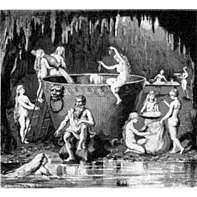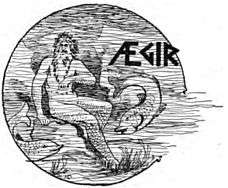Ægir
Ægir (also AEgir, or Aegir; Old Norse: "sea") is the divine personification of the sea in Norse mythology. Portrayed as a jötunn, Ægir is also a frequent host of the gods. In the Poetic Edda, Ægir has a wife, Rán, with whom he has Nine Daughters associated with the waves, and his servants are named Fimafeng and Eldir.[1]

Name
Etymology
The Old Norse name Ægir ('sea') could stem from Proto-Germanic *āgwi-jaz,[2] itself a derivative of *ahwō- ('river'; compare with Goth. alva 'body of water, river', OE ēa 'stream', OHG aha 'river').[3] Richard Cleasby and Guðbrandur Vigfússon saw his name as deriving from an ancient Indo-European root.[4] Guus Kroonen argues that the Germanic root *ahwō- is probably of Proto-Indo-European origin, as it may be cognate with Latin aqua, Sanskrit áp- ('water'), and with Hittite hapa, Old Irish aub ('river').[3]
Alternative names
Poetic kennings in both Hversu Noregr byggðist (How Norway Was Settled) and Skáldskaparmál (The Language of Poetry) treat Ægir and the sea-giant Hlér, who lives on the Hlésey ('Hlér island', modern Læsø), as the same figure.[5][6][7]
Both the prose introduction to Lokasenna (Loki's Flyting) and Skáldskaparmál state that Ægir is also known as Gymir, the father of the giantess Gerðr.[8] Rudolf Simek argues that it may be an erroneous interpretation of kennings in which different giant-names are used interchangeably.[9]
Skaldic poetry
The name 'Ægir' is identical to a noun for 'sea' in skaldic poetry, itself a base word in many kennings. For instance, a ship is described as "Ægir's horse" and the waves as the "daughters of Ægir".[1]
In his treatise of poetry Skáldskaparmál, Snorri Sturluson portrays Ægir as sitting in Ásgard next to the Norse god of poetry Bragi. The latter tells him many stories of events in which the Æsir have participated, then Ægir questions Bragi about the origin of the mead of poetry.[10] In the dialogue, Ægir asks why the gold is called 'fire of the sea' or 'fire of Ægir', then Bragi answers that Gold was used to light Ægir’s hall when he entertained the Æsir.[11]
The short conversation has been regarded as a framed master-disciple dialogue in which Bragri's voice is that of Snorri himself discussing skaldic poetry.[7]
Attestations
Host of the gods
Ægir is often portrayed in the eddic poems as the host of the gods.[12][1] In Hymiskviða, Thor acquires a huge cauldron in which to brew beer as the gods expect to visit Ægir. In Lokasenna (Loki's Flyting), Loki's verbal duel with the gods occurs at a feast hosted by Ægir, and the poem is also called Ægisdrekka (Ægir’s Drinking Party) by paper manuscripts. During the party, Loki kills one of Ægir’s servant Fimafeng.[1] In Grímnismál, Ægir’s prowess as a host is the final motif Odin reveals to the King Geirröd.[7] In Skáldskaparmál (56), Snorri also depicts Ægir as a guest of the Æsir. According to Orchard, this could be a deliberate inversion of the traditional motif of Ægir as a host.[12]
|
A. Orchard translation (1997):
There was a figure called Ægir or Hlér; he lived on an island, which is now called Hléysey. He was very crafty in magic. He set off to visit Ásgard, and when the Æsir realized he was coming, he was given a splen did welcome, although many things were not as they seemed;[12] |
Family

In Skáldskaparmál, the goddess Rán is portrayed as the wife of Ægir, and from their relationship were born Nine Daughters associated with the waves.[1] In several mnemonic þulur name-lists, Ægir is attached to the giants.[14] Lindow notes that since his wife Rán is listed among the goddesses in the same part of the Prose Edda, and as he had a friendly relationship with the gods, Ægir's description as a giant appears questionable.[1] Orchard argues that on the contrary that Ægir's inclusion among the gods (Æsir) is probably a late development since his daughters are described as giants and some sources mention him as the descendant of the giant Fornjót.[14]
In what appears to be a Norwegian genealogical tradition, Ægir is regarded as one of the three elements among the sea, the fire and the wind. The beginning of the Orkneyinga saga (Saga of the Orkney Islanders) and Hversu Noregr byggdisk (How Norway Was Settled) tells that the giant king Fornjót had three sons: Hlér ('sea'), whom he called Ægir, a second named Logi ('fire'), and a third called Kári ('wind').[11]
Legacy
Ægir is the namesake of the exoplanet Epsilon Eridani b.[15]
References
- Lindow 2002, p. 47.
- Haudry 2017, pp. 29–30.
- Kroonen 2013, p. 7.
- Cleasby, Vigfússon (1957:758).
- de Vries 1956, p. 251.
- Simek 1996, p. 151.
- Lindow 2002, p. 18.
- Lindow 2002, p. 156.
- Simek 1996, p. 126.
- Lindow 2002, pp. 48, 52.
- Lindow 2002, p. 48.
- Orchard 1997, p. 1.
- Faulkes 1987, p. 59.
- Orchard 1997, p. 2.
- Carroll, Michael (2017), Earths of Distant Suns, Springer, p. 79, doi:10.1007/978-3-319-43964-8_5, ISBN 978-3-319-43963-1,
Planet name: AEgir | Original designation: Epsilon Eridani b
Missing or empty|title=(help);|chapter=ignored (help)
Bibliography
- Cleasby, Richard, Guðbrandur Vigfússon (1957). An Icelandic-English Dictionary. 2nd ed. with supplement by William A. Craigie. Clarendon Press. Repr. 1975. ISBN 9780198631033
- de Vries, Jan (1956). Altgermanische Religionsgeschichte (in German). 1 (1970 ed.). Walter De Gruyter.CS1 maint: ref=harv (link)
- Faulkes, Anthony, trans. (1987). Edda (1995 ed.). Everyman. ISBN 0-460-87616-3.CS1 maint: ref=harv (link)
- Haudry, Jean (2017). Le feu dans la tradition indo-européenne (in French). Arché. ISBN 978-88-7252-343-8.CS1 maint: ref=harv (link)
- Kroonen, Guus (2013). Etymological Dictionary of Proto-Germanic. Brill. ISBN 978-90-04-18340-7.CS1 maint: ref=harv (link)
- Lindow, John (2002). Norse Mythology: A Guide to Gods, Heroes, Rituals, and Beliefs. Oxford University Press. ISBN 978-0-19-983969-8.
- Orchard, Andy (1997). Dictionary of Norse Myth and Legend. Cassell. ISBN 978-0-304-34520-5.CS1 maint: ref=harv (link)
- Simek, Rudolf (1996). Dictionary of Northern Mythology. D.S. Brewer. ISBN 978-0-85991-513-7.